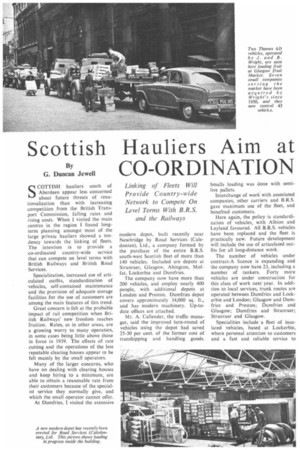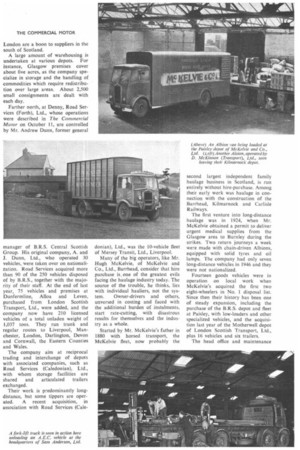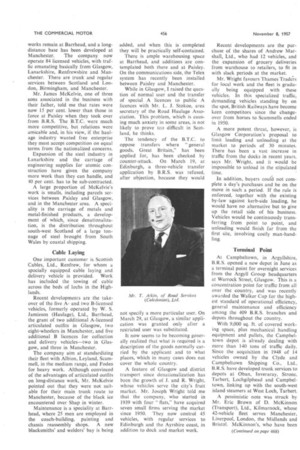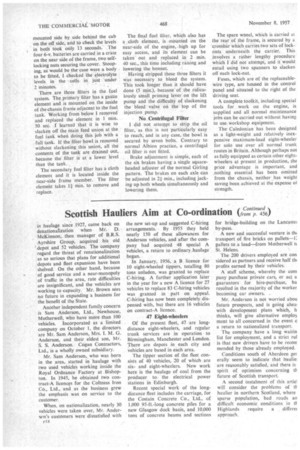Scottish Hauliers Aim at CO-ORDINATION
Page 122

Page 123

Page 124

Page 140

If you've noticed an error in this article please click here to report it so we can fix it.
Linking of Fleets Will Provide Country-wide Network to Compete On Level Terms With B.R.S.
and the Railways
By G. Duncan Jewell
SCOTTISH hauliers south of Aberdeen appear less concerned about future threats of renationalization than with increasing competition from the British Transport Commission, falling rates and rising costs. When I visited the main centres in the region I found longterm planning amongst most of the large private hauliers showed a tendency towards the linking of fleets. The intention is to provide a co-ordinated country-wide service that can compete on level terms with British Railways and British Road Services.
Specialization, increased use of articulated outfits, standardization of vehicles, self-contained maintenance and the provision of adequate storage facilities for the use of customers are among the main features of this trend.
Great concern is felt at the probable impact of rail competition when British Railways' new freedom reaches fruition. Rates, as in other areas, are a growing worry to many operators, in some cases being little above those in force in 1939. The effects of rate cutting and the operations of the less reputable clearing houses appear to be felt mainly by the small operators.
Many of the larger concerns, who have no dealing with clearing houses and keep hiring to a minimum, are able to obtain a reasonable rate from their customers because of the specialist service they normally give, and which the small operator cannot offer. At Dumfries, I visited the extensive modern depot, built recently near Newbridge by Road Services (Caledonian), Ltd., a company formed by the purchase of the entire B.R.S. south-west Scottish fleet of more than 140 vehicles. Included are depots at Stranraer, Glasgow, Abington, Moffat, Lockerbie and Dumfries.
The company now have more than 200 vehicles, and employ nearly 400 people, with additional depots at London and Preston. Dumfries depot covers approximately 34,000 sq. ft., and has modern machinery. Up-todate offices are attached.
Mr. A. Callender, the traffic manager, said the improved turn-round of vehicles using the depot had saved 25-30 per cent. of the former cost of transhipping and handling goods. Smalls loading was done with semilive pallets. Interchange of work with associated companies, other carriers and B.R.S. gave maximum use of the fleet, and benefited customers.
Here again, the policy is standardization of vehicles, with Albion and Leyland favoured. All B.R.S. vehicles have been replaced and the fleet is practically new. Future development will include the use of articulated outfits for all long-distance work.
The number of vehicles under contract-A licence is expanding and the company now have 23, including a number of tankers. Forty more vehicles are under construction for this class of work next year. In addition to local services, trunk routes are operated between Dumfries and Lockerbie and London; Glasgow and Dumfries and Preston; Dumfries and Glasgow; Dumfries and Stranraer; Stranraer and Glasgow.
Specialities include a fleet of insulated vehicles, based at Lockerbie, where personal attention to customers and a fast and reliable service to London are a boon to suppliers in the south of Scotland.
A large amount of warehousing is undertaken at various depots. For instance, Glasgow premises cover about five acres, as the company specialize in storage and the handling of commodities which require redistribution over large areas. About 2,500 small consignments are dealt with each day.
Farther north, at Denny, Road Services (Forth), Ltd., whose operations were described in The Commercial Motor on October 11, are controlled by Mr. Andrew Dunn, former general
manager of B.R.S. Central Scottish Group. His original company, A. and 3. Dunn, Ltd., who operated 30 vehicles, were taken over on nationalization. Road Services acquired more than 90 of the 250 vehicles disposed of by B.R.S., together with the majority of their staff. At the end of last year, 75 vehicles and premises at Dunfermline, Alloa and Leven, purchased from London Scottish Transport, Ltd., were added, and the company now have 210 licensed vehicles of a total unladen weight of 1,037 tons. They run trunk and regular routes to Liverpool, Manchester, London, Darlington, Devon and Cornwall, the Eastern Counties and Wales.
The company aim at reciprocal trading and interchange of depots with associated companies, such as Road Services (Caledonian), Ltd., with whom storage facilities are shared and articulated trailers exchanged.
Their work is predominantly longdistance, but some tippers are operated. A recent acquisition, in association with Road Services (Cale
donian), Ltd., was the 10-vehicle fleet of Mersey Transit, Ltd., Liverpool.
Many of the big operators, like Mr. Hugh McKelvie, of McKelvie and Co., Ltd., Barrhead, consider that hire purchase is.one of the greatest evils facing the haulage industry today. The source of the trouble, he thinks, lies with individual hauliers, not the system. Owner-drivers and others, unversed in costing and faced with the additional burden of instalments, start rate-cutting, with disastrous results for themselves and the industry as a whole.
Started by Mr. McKelvie's father in 1880 with horsed transport, the McKelvie fleet, now probably the second largest independent family haulage business in Scotland, is run entirely without hire-purchase. Among their early work was haulage in connection with the construction of the Barrhead, Kilmarnock and Carlisle Railways.
The first venture into long-distance haulage was in 1924, when Mr. McKelvie obtained a permit to deliver urgent medical supplies from the Glasgow area to Burnley during the strikes. Two return journeys a week were made with chain-driven Albions, equipped with solid tyres and oil lamps. The company had only seven long-distance vehicles in 1946 and they were not nationalized.
Fourteen goods vehicles were in operation on local work when McKelvie's acquired the first two eight-wheelers in No. 1 disposal list. Since then their history has been one of steady expansion, including the purchase of the B.R.S. depot and fleet at Paisley, with low-loaders and other specialized vehicles, and the acquisition last year of the Motherwell depot of London Scottish Transport, Ltd., plus 16 vehicles and six trailers.
The head office and maintenance works remain at Barrhead, and a longdistance base has been developed at Manchester. The company now operate 84 licensed vehicles, with traffic emanating basically from Glasgow, Lanarkshire, Renfrewshire and Manchester. There are trunk and regular services between Scotland and London, Birmingham, and Manchester.
Mr. James McKelvie, one of three sons associated in the business with their father, told me that rates were now 15 per cent. lower than those in force at Paisley when they took over from B.R.S. The B.T.C. were much more competitive, but relations were amicable and, in his view, if the haulage industry wanted free enterprise they must accept competition on equal terms from the nationalized concerns.
Expansion of the steel industry in Lanarkshire and the carriage of engineering supplies for atomic construction have given the company more work than they can handle, and 40 per cent. has to be sub-contracted.
A large proportion of McKelvie's work is smalls, including parcels services between Paisley and Glasgow, and in the Manchester area. A speciality is the carriage of metals and metal-finished products, a development of which, since denationalization, is the distribution throughout south-west Scotland of a large tonnage of steel brought from South Wales by coastal shipping.
Cable Laying
One important customer is Scottish Cables, Ltd., Renfrew, for whom a specially equipped cable laying and delivery vehicle is provided. Work has included the towing of cable across the beds of lochs in the Highlands.
Recent developments are the takeover of the five Aand two B-licensed vehicles, formerly operated by W. S. Jamieson (Haulage), Ltd., Barrhead, the grant of two additional A-licensed articulated outfits in Glasgow, two eight-wheelers in Manchester, and five additional B licences for collection and delivery vehicles—two in Glasgow, and three in Manchester.
The company aim at standardizing their fleet with Albion, Leyland, Scammell, in the medium range, and Foden for heavy work. Although convinced of the advantages of articulated outfits on long-distance work, Mr. McKelvie pointed out that they were not suitable for their main trunk route to Manchester, because of the black ice encountered over Shap in winter.
Maintenance is a speciality at Barrhead, where 25 men are employed in the coach-building, painting and chassis reassembly shops. A new blacksmiths' and welders' bay is being added, and when this is completed they will be practically self-contained.
There is ample warehousing space at Barrhead, and additions are contemplated both there and at Paisley. On the communications side, the Telex system has recently been installed between Paisley and Manchester.
While in Glasgow, I raised the question of normal user and the transfer of special A licences to public A licences with Mr. L. J. Stokoe, area secretary of the Road Haulage Association. This problem, which is causing much anxiety in some areas, is not likely to prove too difficult in Scotland, he thinks.
The tendency of the B.T.C. to oppose transfers where general goods, Great Britain," has been applied for, has been checked by counter-attack. On March 19, at Edinburgh, a three-vehicle transfer application by B.R.S. was refused, after objection, because they would not specify a more particular user. On March 29, at Glasgow, a similar application was granted only after a restricted user was substituted.
It now seems to be becoming generally realized that what is required is a description of the goods normally carried by the applicant and to what places, which in many cases does not cover the whole country.
A feature of Glasgow and district transport since denationalization has been the growth of J. and R. Wright, whose vehicles serve the city's fruit market. Mr. Joseph Wright told me that the company, who started in 1939 with four 'flats," have acquired seven small firms serving the market since 1950. They now control 45 vehicles, with regular services to Edinburgh and the Ayrshire coast, in addition to dock and market work. Recent developments are the purchase of the shares of Andrew Marshall, Ltd., who had 12 vehicles, and the expansion of grocery deliveries from warehouse to retailers, to fit in with slack periods at the market.
Mr. Wright favours Thames Traders for local work and the fleet is gradually being equipped with these vehicles. In this specialized traffic, demanding vehicles standing by on the spot, British Railways have become keen competitors since the changeover from horses to Scammells ended in 1950.
A more potent threat, however, is Glasgow Corporation's proposal to limit loading and unloading at the market to periods of 30 minutes. There has been a vast increase in traffic from the docks in recent years. says Mr. Wright, and it would be impossible to unload in the stipulated time.
In addition, buyers could not complete a day's purchases and be on the move in such a period. If the rule is enforced, together with the existing by-law against kerb-side loading, he would have no alternative but to give up the retail side of his business. Vehicles would be continuously trans ferring from point to point, and unloading would finish far from the first site, involving costly man-handling.
Terminal Point At Campbeltown, in Argyllshire, B.R.S. opened a new depot in June as a terminal point for overnight services from the Argyll Group headquarters at Warrock Street, Glasgow. This is a concentration point for traffic from all over the country, and was recently awarded the Walker Cup for the highest standard of operational efficiency, general maintenance and efficiency among the 409 B.R.S. branches and depots throughout the country.
With 9,000 sq. ft. of covered working space, plus mechanical handling equipment and pallets, the Campbeltown depot is already dealing with more than 140 tons of traffic daily. Since the acquisition in 1948 of 14 vehicles owned by the Clyde and Campbeltown Shipping Co., Ltd.. B.R.S. have developed trunk services to depots at Oban, Inveraray, Strone. Tarbert, Lochgilphead and Campbeltown, linking up with the south-west island steamers at West Loch, Tarbert.
A pessimistic note was struck by Mr. Eric Brown of D. McKinnon (Transport), Ltd., Kilmarnock, whose 42-vehicle fleet serves Manchester, Liverpool, London, the Midlands and Bristol. McKinnon's, who have been in haulage since 1927, came back on denationalization when Mr. D. McKinnon, then manager of B.R.S. Ayrshire Group, acquired his old depot and 52 vehicles. The company regard the threat of renationalization as so serious that plans for additional depots and fleet expansion have been shelved. On the other hand, because of good service and a near-monopoly of traffic in the area, rate difficulties are insignificant, and the vehicles are working to capacity. Mr. Brown sees no future in expanding a business for the benefit of the State.
Another independent family concern is Sam Anderson, Ltd., Newhouse, Motherwell, who have more than 100 vehicles. Incorporated as a limited company on October I, the directors are Mr. Sam Anderson, Mrs. I. M. G. Anderson, and their eldest son, Mr. S. S. Anderson. Cogan Contractors, Ltd., is a wholly owned subsidiary.
Mr. Sam Anderson, who was born in the area, started in haulage with two used vehicles working inside the Royal Ordnance Factory at Bishopton. In 1945, he obtained two contract-A licences for the Coltness Iron Co., Ltd., and as the business grew the emphasis was on service to the customer.
When, on nationalization, nearly 30 vehicles were taken over, Mr. Anderson's customers were dissatisfied with the new set-up and suggested C-hiring arrangements. By 1955 they held nearly 150 of these allowances for Anderson vehicles, and after the company had acquired 48 special A vehicles, a return to ordinary haulage' began.
In January, 1956, a B licence for 10 eight-wheeled tippers, totalling 80 tons unladen, was granted to replace C-hiring. A further application later in the year for a new A licence for 27 vehicles to replace 83 C-hiring vehicles was granted in part on appeal. C-hiring has now been completely dispensed with, but there are 16 vehicles on contract-A licence.
47 Eight-wheelers
Of the present fleet, 47 are longdistance eight-wheelers, and regular trunk services are in operation to Birmingham, Manchester and London. There are depots in each city and vehicles are based in each area.
The tipper section of the fleet consists of 40 vehicles, 20 of which are sixand eight-wheelers. New work here is the haulage of coal from the producer to the electrical power stations in Edinburgh.
Recent special work of the longdistance fleet includes the carriage, for the Costain Concrete Co., Ltd., of 1,000 95-ft.-long concrete piles for a new Glasgow dock basin, and 10,000 tons of concrete beams and sections for bridge-building on the Lancastei by-pass.
A new and successful venture is tfk transport of fire bricks on pallets-1: pallets to a load—from Motherwell 11 Si. Helens.
The 200 drivers employed are con sidered as partners and receive half tho profits earned by their vehicles.
A staff scheme, whereby the corn pany purchase private cars, or act a guarantors for hire-purchase, ha resulted in the majority of the worker becoming car owners. .
Mr. Anderson is not worried abou future prospects, and is going aheal with development plans which, h thinks, will give alternative employ meat to all concerned in the event c a return to nationalized transport.
The company have a long waitin list for employment, and a strict rul is that new drivers have to be recoir mended by those already employed.
Conditions south of Aberdeen ger erally seem to indicate that fraulie, are reasonably satisfied, and there is spirit of optimism concerning th future of Scottish transport.
A second instalment of this articl will consider the problems of a haulier in northern Scotland, where sparse population, bad roads an difficult economic conditions in tF Highlands require a differei approach.




























































































































































































































































